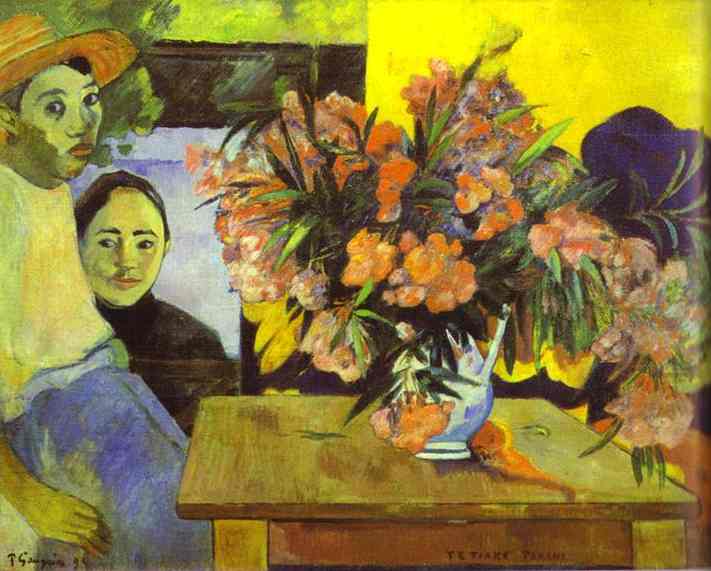Beschrijving
Paul Gauguin’s “Flowers of France,” painted in 1891, stands as a vibrant display of color and form, characteristic of the post-impressionist artist’s compositions. In this painting, Gauguin delves into the rich floral tradition while evoking a sense of place and emotional connection through his distinctive approach. The work not only captures the essence of flowers, but also falls within a personal and cultural quest by the artist, who at this point in his life was torn between exploring symbolism and representation.
The canvas is constructed like a tapestry of intense colors. Deeply saturated shades of red, yellow and green dominate, each intensifying the visual imprint it leaves on the viewer. Gauguin’s vibrant palette creates an almost dreamlike atmosphere, an environment that seems to pulsate with life. The flowers, arranged in an almost sculptural manner, are rendered in rich detail that invites contemplation beyond the mere observation of nature. The apparent symmetry and radial organization of the flowers unfold a form that recalls both ornamentation and the pure expression of emotions.
Through his distinctive style, Gauguin reduces the realist complexity that dominated the art of his time, opting instead for a more abstract approach that emphasizes the essence of the subjects rather than their direct representation. In this work, the flowers can be seen as vectors of meaning, evoking thoughts about the transience of life and beauty. Although there are no human characters visible in this painting, the presence of the flowers can be interpreted as a symbol of the life and culture of the places the artist yearned for and explored.
Gauguin was at a crucial phase of his career, defining his artistic path between impressionist influences and a more symbolic and emotive approach. The search for cultural authenticity and the evocation of deep feelings are reflected in the way he handles visual elements in “Flowers of France.” The work can be associated with other pieces from his period, where the artist dedicated himself to exploring the relationship between color, form and meaning, such as in “Women of Tahiti” or “The Vision of the Sermon.”
Although less well-known than some of his other works, “Flowers of France” is a tribute to Gauguin’s mastery of depicting reality through the controlled distortion of form and color. The work invites the viewer to immerse themselves in a world where nature is transformed into a visual language filled with symbolism, a characteristic that will continue to resonate in modern and contemporary works. This canvas encapsulates not only the essence of French flora, but also a significant chapter in the evolution of post-impressionist art, marking a moment when art began to break free from the shackles of strict representation towards a deeper exploration of the human experience.
KUADROS ©, a famous painting on your wall.
Hand-made oil painting reproductions, with the quality of professional artists and the distinctive seal of KUADROS ©.
Painting reproduction service with satisfaction guarantee. If you are not completely satisfied with the replica of your painting, we will refund 100% of your money.

